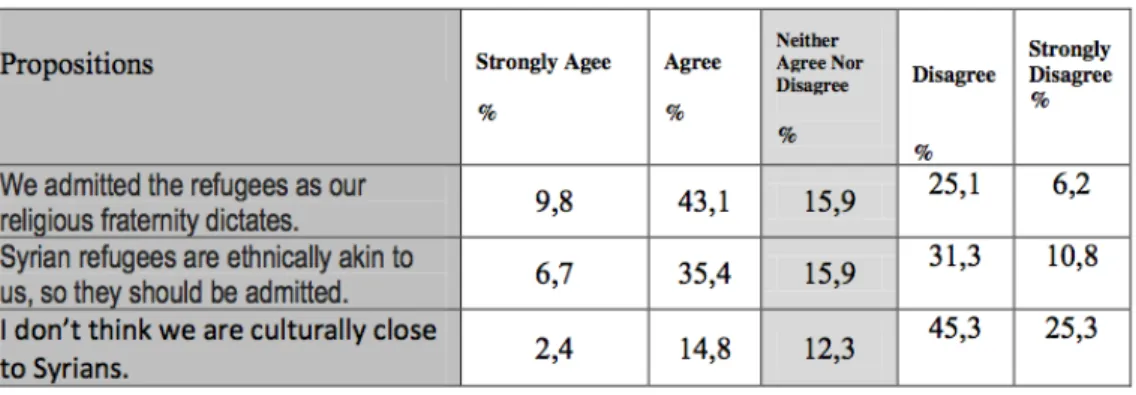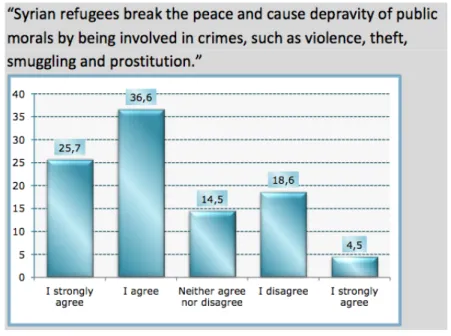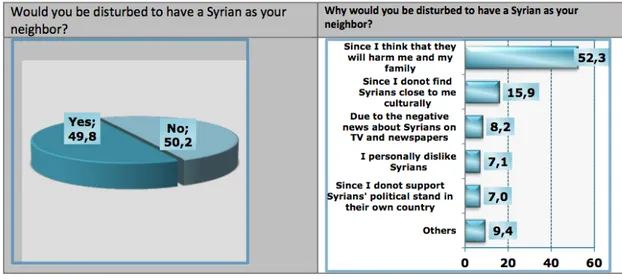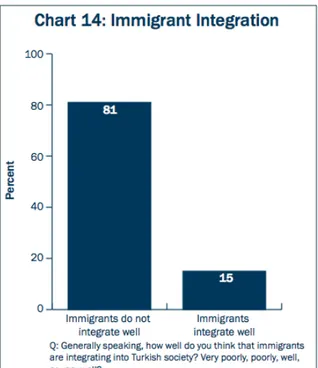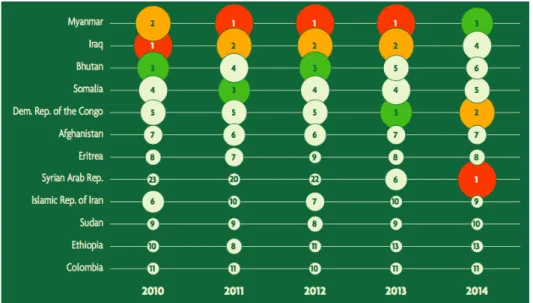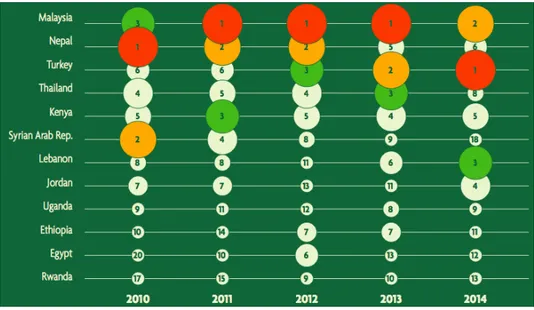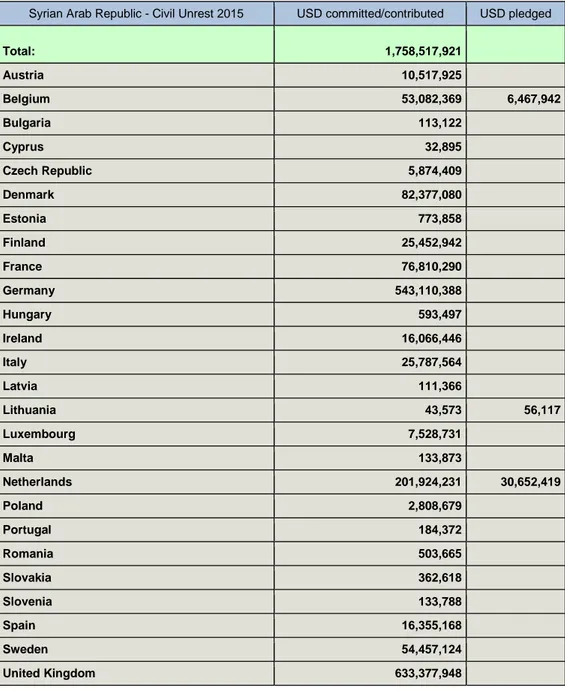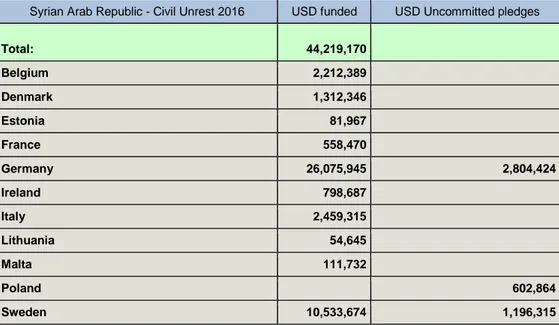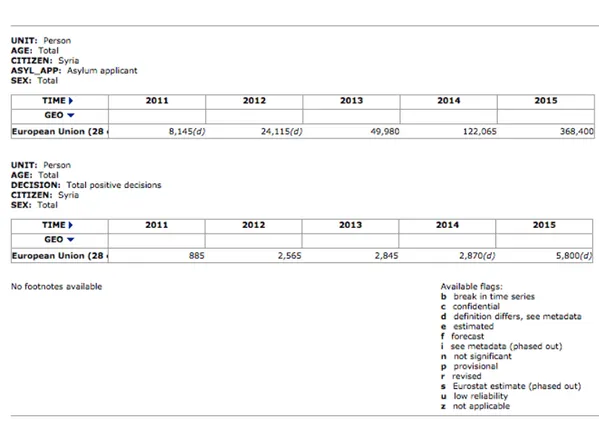REFUGEES?
Ceren ELİTEZ
111614010
İSTANBUL BİLGİ ÜNİVERSİTESİ
SOSYAL BİLİMLER ENSTİTÜSÜ
HUKUK YÜKSEK LİSANS PROGRAMI
(İNSAN HAKLARI HUKUKU)
Doç. Dr. Lami Bertan TOKUZLU
ÖZET
Suriye krizi, çağımızın en zorlu insani krizidir. Suriyelilerin toplu halde yerinden edilmesi, yalnızca -Suriyeli sayısının en çok olduğu ülke olan Türkiye dahil olmak üzere- Suriye’nin komşularında değil, Avrupa Birliği’nin üye ülkelerinde de zorluklar yaratmıştır. Kriz aynı zamanda uluslararası iltica sistemi, İnsan Hakları Hukuku ve Mülteci Hukuku çerçevesinde karşımıza çıkan “sorumluluk paylaşımı” prensibini de gündeme getirmiştir.
Yerinden edilen Suriyelilerin korunması ve bakımı üzerine Türkiye ile AB arasında yürütülen uzun müzakereler sonucunda, taraflar AB-Türkiye “Mülteci Anlaşması” olarak adlandırılan bir metin üzerinde mutabık olmuştur. Anlaşma, bunun uluslararası İnsan Hakları Hukuku’nun, Mülteci Hukuku’nun ve AB İltica Hukuku’nun genel ilkelerini ihlal etmesini eleştiren akademisyenler, yasal uzmanlar ve uluslararası STK’lar tarafından bir dizi itirazla karşılanmıştır.
Bu çalışma, AB ve Türkiye’yi “Mülteci Anlaşması”nı imzalamaya götüren yolu, anlaşmanın içeriğini, maddelerini, sonuçlarını ve uygulamada ortaya çıkabilecek olası riskleri incelemektedir. Aynı zamanda anlaşmanın uluslararası insani mekanizmalar çerçevesinde ele alınan sorumluluk paylaşımı kavramına yapacağı katkıları ya da vereceği zararları vurgulamaktadır.
ABSTRACT
The Syrian displacement crisis is the most compelling humanitarian crisis of our times. The mass displacement of Syrians did not only cause challenges for Syria’s neighboring countries -including Turkey as the largest host of displaced Syrians- but also the European Union Member States. It has also call into question the principle of “responsibility-sharing” in the context of the international protection of refugees, Human Rights Law and Refugee Law.
As a result of a long negotiation process between Turkey and EU over the protection, and care of displaced Syrians, the parties agreed upon a text that is called the EU-Turkey “Refugee Deal”. The deal was met with a chorus of objection by scholars, legal experts and international NGOs who criticized it for contradicting the general principles of the international Human Rights Law, Refugee Law and the EU Asylum Law.
This paper studies the pathway that lead EU and Turkey to sign the “Refugee Deal”, its content and clauses, implications and potential risks that are likely to occur in practice, with an emphasis on the contribution and/or detriment that the deal would bring to the notion of responsibility-sharing in international humanitarian system.
CONTENT
CONTENT ………....i
ABBREVIATIONS ……….ii
REFERENCES ………...iii
ELECTRONIC RESOURCES ………...xv
TABLE OF FIGURES ………..xvi
I. Introduction ………....1
II. The Road to the EU-Turkey “Refugee Deal”: The Question of Responsibility-Sharing for a Durable Solution to Syrian Displacement Crisis ………...6
A- Turkey: Lack of a Comprehensive Integration Policy for the Bulk of Syrian Refugees ………....7
1- Lack of Long-Term Legal Integration: Temporary Protection Regime ………..11
2- Education: Key to Integration ………..14
3- Employment and Economic Hardship ……….18
4- Fear from Political Instability in Turkey ………...20
5- Social Resentment and Violence towards Syrian Refugees in Turkey ………24
B- Responsibility-Sharing So Far and the “Refugee Deal”: Protecting Refugees or Protecting Europe? ………...29
1- The Question of Responsibility-Sharing for a Durable Solution to Syrian Displacement Crisis ………..29
2- Resettlement ………...31
3- Financial Assistance ……….36
4- The Consequences of the EU’s Reluctance to Share Responsibility ………...41
III. EU-Turkey “Refugee Deal” and Its Implications ………....44
A- Negotiations and the Content of the “Refugee Deal” ………..45
B- Legality and Implications of the “Refugee Deal” ………....53
1- Legality as per the international Human Rights Law and European Asylum Law ………54
2- Turkey as a “Safe Third Country” ………...63
3- The Situation in Greece ………...66
ABBREVIATIONS
AFAD : Disaster and Emergency Management Presidency APD : Asylum Procedures Directive
CoE : Council of Europe
DGMM : Directorate General for Migration Management
EC : European Commission
ECHO : European Commission Humanitarian Aid & Civil Protection
ECHR : European Convention on Human Rights ECOSOC : UN Economic and Social Council ECRE : European Council on Refugees and Exiles ECtHR : European Court of Human Rights
EU : European Union
EU Charter : Charter of Fundamental Rights of the European Union GoT : Government of Turkey
HRP : Humanitarian Response Plan
HRW : Human Rights Watch
HUGO : Hacettepe University Migration and Politics Research Center
ICCPR : International Covenant on Civil and Political Rights ILO : International Labor Organization
IOM : International Organization for Migration LFIP : Law on Foreigners and International Protection MFA : Ministry of Foreign Affairs of the Republic of Turkey
MSF : Médecins Sans Frontières NGO : Non-governmental organization PKK : Kurdish Workers’ Party RRP : Regional Response Plan
RRP6 : Syria Regional Response Plan 2014
SHARP : Humanitarian Assistance Response Plan for Syria 2014 SRP : Syria Response Plan 2015
TECs : Temporary education centers
TİSK : Turkish Confederation of Employer Associations TPR : Temporary Protection Regulation
UN : United Nations
UNHCR : United Nations High Commissioner for Refugees UNOCHA : United Nations Office for the Coordination of
Humanitarian Affairs
U.S. : Unites States
UK : United Kingdom
1951 Convention : 1951 Convention Relating to the Status of Refugees 1967 Protocol : 1967 Protocol Relating to the Status of Refugees 1984 Convention : UN Convention against Torture and Other Cruel,
Inhuman or Degrading Treatment or Punishment of 1984 3RP : Syria Regional Refugee and Resilience Plan
REFERENCES
Agence France Press : Agence France Press, “Islamic State claims it killed Bangladeshi academic”, The Guardian, 23 April 2016, accessed on 30 April 2016 at: http://www.theguardian.com/world/2016/apr/23/bangladeshi-professor-hacked-to-death-rajshahi-islamists
Alami : Mona Alami, “NGO finds work for Syrian refugees in Turkey”,
AlMonitor, 7 August 2015, accessed on 30 April 2016 at: http://www.al-
monitor.com/pulse/originals/2015/08/syrian-refugees-turkey-ngo-employment.html
Amnesty International : “Turkey ‘Safe Country’ Sham Revealed as Dozens of Afghans Forcibly Returned Hours After EU Refugee Deal”, Amnesty International, 23 March 2016, accessed on 30 April 2016 at:
https://www.amnesty.org/en/press-releases/2016/03/turkey-safe-country-sham-revealed-dozens-of-afghans-returned/
Associated Press : Associated Press, “Isis claims deadly attack on Pakistani consulate in Afghanistan”, The Guardian, 13 January 2016, accessed on 30 April 2016 at: http://www.theguardian.com/world/2016/jan/13/suicide-bomber-kills-people-eastern-afghanistan-jalalabad
Barnard, Gordon, Schmitt : Anne Barnard, Michael R. Gordon, Eric Schmitt, “Turkey and U.S. Plan to Create Syria ‘Safe Zone’ Free of ISIS”, The New York Times, 27 July 2015, accessed on 30 April 2016 at:
http://www.nytimes.com/2015/07/28/world/middleeast/turkey-and-us-agree-on-plan-to-clear-isis-from-strip-of-northern-syria.html
BBC : BBC Türkçe, “Türkiye-AB anlaşması kapsamında ilk göçmen
kafilesi Dikili'de”, 4 April 2016, accessed on 30 April 2016 at:
http://www.bbc.com/turkce/haberler/2016/04/160403_yunanistan_turkiye_g ocmen
Belfast Telegraph : “EU-Turkey deal 'sends clear message to migrants'”, Belfast Telegraph, 18 March 2016, accessed on 30 April 2016 at:
http://www.belfasttelegraph.co.uk/news/world-news/euturkey-deal-sends-clear-message-to-migrants-34551303.html
BMZ : Newsletter “Special Edition: The BMZ's response to the refugee crisis”, BMZ (German Federal Ministry for Economic Cooperation and Development), February 2016, accessed on 30 April 2016 at:
https://www.bmz.de/en/service/nl/Newsletter_Februar_2016/index.html
Bora : Birce Bora, “Analysis: Is Turkey's 'open door policy' an illusion?”,
AlJazeera, 24 November 2015, accessed on 30 April 2016 at:
http://www.aljazeera.com/news/2015/11/analysis-turkey-open-door-policy-illusion-151124084706365.html
Boswell : Christina Boswell, “Burden-sharing in the New Age of
Immigration”, Migration Policy Institute, 1 November 2003, accessed on 30 April 2016 at: http://www.migrationpolicy.org/article/burden-sharing-new-age-immigration
Circular : Circular No. 2016/8 from Prime Ministry on Irregular Migration
(“Düzensiz Göçle Mücadele ile İlgili Başbakanlık Genelgesi”), Official Gazette no. 29675, 5 April 2016
Circular : Circular No: 2014/21 on Education Services for Foreign Nationals
(“Yabancılara Yönelik Eğitim-Öğretim Hizmetleri”), No. 10230228/235/4145933, 23 September 2014
6 December 2005, available at
http://www.cumhuriyet.com.tr/haber/turkiye/443766/Karin_desip_kafa_deri si_yuzen_gasp_cetesi_yakalandi.html
Çetin : İhsan Çetin, “Why do Syrian refugees leave Turkey?”, Middle
East Monitor, 18 January 2016, accessed on 30 April 2016 at:
https://www.middleeastmonitor.com/articles/europe/23384-why-do-syrian-refugees-leave-turkey
CoE : CoE, ECHR : European Convention for the Protection of Human
Rights and Fundamental Freedoms as amended by Protocols Nos. 11 and 14 (“Avrupa İnsan Hakları Sözleşmesi”), 4 November 1950, Official Gazette no. 8662, 19 March 1954
CoE: ECtHR : Čonka v. Belgium, 51564/99, CoE: ECtHR, 5 February 2002
CoE: ECtHR : Hirsi Jamaa and Others v. Italy, CoE: ECtHR, Application no.
27765/09, 23 February 2012
CoE: ECtHR : Khlaifia and Others v. Italy, CoE: ECtHR, Application no
16483/12, 1 September 2015
CoE: ECtHR : L.M. and Others v. Russia, CoE: ECtHR, Applications nos.
40081/14, 40088/14 and 40127/14, 15 October 2015
CoE: ECtHR : M.S.S. v. Belgium and Greece, CoE: ECtHR, Application no.
30696/09, 21 January 2011
Coe: Parliamentary
Assembly : “The situation of refugees and migrants under the EU-Turkey
Agreement of 18 March 2016: Explanatory memorandum by rapporteur Ms. Tineke Strik”, Reference to committee: Reference 4189 of 18 April 2016 (debate under urgent procedure), 2016 - Second part-session, CoE: Parliamentary Assembly, Report Doc. 14028, accessed on 30 April 2016 at:
http://assembly.coe.int/nw/xml/XRef/Xref-XML2HTML-en.asp?fileid=22612&lang=en
Co-hosts : “Co-Hosts Declaration of the Supporting Syria and the Region
Conference”, London, 4 February 2016, accessed on 30 April 2016 at: https://2c8kkt1ykog81j8k9p47oglb-wpengine.netdna-ssl.com/wp- content/uploads/2016/02/FINAL-Supporting-Syria-the-Region-London-2016-4-Feb.pdf
Del Carpio : Del Carpio, Ximena V., Mathis Wagner. The Impact of Syrians
Refugees on the Turkish Labor Market, Policy Research Working Paper 7402, World Bank – Boston College, August 2015
DeYoung, Sly : Karen DeYoung, Liz Sly, “U.S.-Turkey deal aims to create de facto ‘safe zone’ in northwest Syria”, Washington Post, 26 July 2015, accessed on 30 April 2016 at: https://www.washingtonpost.com/world/new-
us-turkey-plan-amounts-to-a-safe-zone-in-northwest-syria/2015/07/26/0a533345-ff2e-4b40-858a-c1b36541e156_story.html
Durukan, Eşsiz, Tümer : Durukan, Oktay, Veysel Eşsiz, Öykü Tümer. Country Report: Turkey, Asylum Information Database (AIDA), December 2015, available at: http://mhd.org.tr/assets/aida_tr_update.i.pdf
EC : C(2015) 3560 final, Commission Recommendation on a European
resettlement scheme, European Commission, 8 June 2015, accessed on 30 April 2016 at: http://ec.europa.eu/dgs/home-affairs/e-library/documents/policies/asylum/general/docs/recommendation_on_a_eur opean_resettlement_scheme_en.pdf
humanitarian admission scheme with Turkey, European Commission, 15 December 2015, accessed on 30 April 2016 at: http://ec.europa.eu/dgs/home-affairs/what-we-do/policies/securing-eu-borders/legal-documents/docs/commission_recommendation_for_a_ voluntary_humanitarian_admission_scheme_with_turkey_en.pdf
EC : COM(2015) 240 final, Communication
from the Commission to the European Parliament, the Council, the European Economic and Social Committee and the Committee of the Regions: a European Agenda On Migration, European Commission, 13 May 2015, accessed on 30 April 2016 at:
http://ec.europa.eu/lietuva/documents/power_pointai/communication_on_th e_european_agenda_on_migration_en.pdf
EC : COM(2015) 452 final, Proposal for a Regulation of the European Parliament and of the Council Establishing an EU Common List of Safe Countries of Origin, European Commission, 9 September 2015, accessed on 30 April 2016 at: http://ec.europa.eu/dgs/home-affairs/what-we-
do/policies/european-agenda-migration/proposal-implementation-package/docs/proposal_for_regulation_of_the_ep_and_council_establishing _an_eu_common_list_of_safe_countries_of_origin_en.pdf
EC : COM(2016) 85 final, Communication from the Commission to the
European Parliament and the Council on the State of Play of Implementation of the Priority Actions under the European Agenda on Migration, European Commission, 10 February 2016, accessed on 30 April 2016 at: http://ec.europa.eu/dgs/home-affairs/what-we-
do/policies/european-agenda-migration/proposal-implementation-package/docs/managing_the_refugee_ crisis_state_ of_play_20160210_en.pdf
EC : JOIN(2015) 40 final, Joint Communication To The European
Parliament And The Council Addressing the Refugee Crisis in Europe: The Role of EU External Action, European Commission, 9 September 2015, accessed on 30 April 2016 at: http://ec.europa.eu/dgs/home-affairs/what- we-do/policies/european-agenda-migration/proposal-implementation-package/docs/communication_on_addressing_the_external_dimension_of_t he_refugee_crisis_en.pdf
EC : Factsheet “EU-Turkey joint action plan”, European Commission,
15 October 2015, accessed on 30 April 2016 at: http://europa.eu/rapid/press-release_MEMO-15-5860_en.htm
EC : “Managing the Refugee Crisis - EU-Turkey Joint Action Plan:
Implementation Report”, European Commission, n.d., accessed on 30 April 2016 at:
http://ec.europa.eu/dgs/home-affairs/what-we-do/policies/european-agenda-
migration/background-
information/docs/managing_the_refugee_crisis_-_eu-turkey_join_action_plan_implementation_report_20160210_en.pdf
EC : Press release “EU-Turkey Cooperation: A €3 billion Refugee Facility for Turkey”, European Commission, 24 November 2015, accessed on 30 April 2016 at: http://europa.eu/rapid/press-release_IP-15-6162_en.htm
EC : Press release “European Commission makes progress on Agenda
on Migration”, European Commission, 27 May 2015, accessed on 30 April 2016 at: http://europa.eu/rapid/press-release_IP-15-5039_en.htm
Humanitarian Aid and Civil Protection (ECHO), Brussels-Belgium, March 2016
ECRE : “Memorandum to the European Council Meeting 17 – 18 March
2016: Time to Save the Right to Asylum”, ECRE, Brussels, 11 March 2016, accessed on 30 April 2016 at: www.ecre.org/component/downloads/downloads/1081.html
ECRE : Weekly Bulletin, ECRE, 25 March 2016, accessed on 30 April
2016 at: http://eepurl.com/bVfPY5
EDAM : Public Opinion Surveys of Turkish Foreign Policy 2014/1
“Reaction mounting against Syrian refugees in Turkey”, EDAM, n.p., 2014
Ekşi : Ekşi, Nuray. Türkiye Avrupa Birliği Geri Kabul Antlaşması, Beta,
İstanbul, March 2016
Ekşi : Nuray Ekşi, “Türkiye-Avrupa Birliği Geri Kabul Anlaşması: Bir
Hatalar Zinciri”, Legal Hukuk Dergisi, Volume: 14, Issue:163, 2016
Erdoğan : Erdoğan, M. Murat. Syrians in Turkey: Social Acceptance and
Integration Research Executive and Summary Report, HUGO, Ankara, November 2014
EU : EU, 2012/C 326/02, Charter of Fundamental Rights of the
European Union, 26 October 2012, OJ 2000/C 364/01, 18 December 2000
EU : EU, Council of the EU, Council Directive 2005/85/EC of 1
December 2005 on Minimum Standards on Procedures in Member States for Granting and Withdrawing Refugee Status, 13 December 2005, OJ L 326, 2 January 2006,
EU : EU: Council of the EU, Directive 2008/115/EC of the European Parliament and of the Council of 16 December 2008 on Common Standards and Procedures in Member States for Returning Illegally Staying Third-Country Nationals, 16 December 2008, OJ L. 348/98-348/107, 24 December 2008
EU : EU: Council of the EU, Directive 2013/32/EU of the European
Parliament and of the Council of 26 June 2013 on Common Procedures for Granting and Withdrawing International Protection (Recast), 26 June 2013, OJ L. 180/60 -180/95, 29 June 2013
EU : EU: Council of the EU, Directive 2013/33/EU of the European
Parliament and Council of 26 June 2013 Laying Down Standards for the Reception of Applicants for International Protection (Recast), 26 June 2013, OJ L. 180/96 -105/32, 29 June 2013
European Council : EUCO 22/15, CO EUR 8, CONCL 3, Meeting conclusions,
European Council, 26 June 2015,
http://www.consilium.europa.eu/en/meetings/european-council/2015/06/EUCO-conclusions-pdf/
European Council : “European Council Meeting”, European Council, 17-18 March
2016, accessed on 30 April 2016 at:
http://www.consilium.europa.eu/en/meetings/european-council/2016/03/17-18/
European Council : “Justice and Home Affairs Council”, European Council, 20 July 2015, accessed on 30 April 2016 at:
http://www.consilium.europa.eu/en/meetings/jha/2015/07/20/
European Council : “Justice and Home Affairs Council”, European Council, 10-11 March 2016, accessed on 30 April 2016 at:
http://www.consilium.europa.eu/en/meetings/jha/2016/03/10-11/
Turkey statement”, European Council, 29 November 2015, accessed on 30 April 2016 at: http://www.consilium.europa.eu/en/press/press-releases/2015/11/29-eu-turkey-meeting-statement/
European Council : “Meeting of the EU heads of state or government with Turkey”, European Council, 7 March 2016, accessed on 30 April 2016 at:
http://www.consilium.europa.eu/en/meetings/international-summit/2016/03/07/
European Council : Press release “Council Conclusions on Measures to handle the refugee and migration crisis”, European Council, 9 November 2015, accessed on 30 April 2016 at: http://www.consilium.europa.eu/en/press/press-releases/2015/11/09-jha-council-conclusions-on-measures-to-handle-refugee-and-migration-crisis/
European Council : Press release “EU-Turkey statement”, European Council, 18 March 2016, accessed on 30 April 2016 at: http://www.consilium.europa.eu/en/press/press-releases/2016/03/18-eu-turkey-statement/
European Council : Press release “European Council Conclusions on migration”, European Council, 18 February 2016, accessed on 30 April 2016 at: http://www.consilium.europa.eu/en/press/press-releases/2016/02/18-euco-conclusions-migration/
European Council : Press release “Refugee facility for Turkey: Member states agree on details of financing”, European Council, 3 February 2016, accessed on 30 April 2016 at: http://www.consilium.europa.eu/en/press/press-releases/2016/02/03-refugee-facility-for-turkey/
European Council : Statement, Special meeting of the European Council, European Council, 23 April 2015, accessed on 30 April 2016 at:
http://www.consilium.europa.eu/en/press/press-releases/2015/04/23-special-euco-statement/
European Council : “Statement of the EU Heads of State or Government”, European Council, 8 March 2016, accessed on 30 April 2016 at:
http://www.consilium.europa.eu/en/press/press-releases/2016/03/07-eu-turkey-meeting-statement/
Frelick : Bill Frelick, “Why Don’t Syrians Stay in Turkey”, HRW, 29
September 2015, accessed on 30 April 2016 at: https://www.hrw.org/news/2015/09/29/why-dont-syrians-stay-turkey
GMF : Turkish Perceptions Survey 2015, GMF, Washington DC, 2015
Güneş, Lowe : Güneş, Cengiz, Robert Lowe. The Impact of the Syrian War on
Kurdish Politics Across the Middle East, Chatham House, London, August 2015
Gürses, Rinke : Ercan Gürses, Andreas Rinke, “Germany seeking 'safe zones' in Syria to shelter refugees”, Reuters, 23 April 2016, accessed on 30 April 2016 at: http://www.reuters.com/article/us-europe-migrants-turkey-germany-idUSKCN0XK0BS
Hall, Ferris : A. Matthew Hall, Elizabeth Ferris, “What Would the Turkish Buffer Zone Mean for Syria’s Displaced?”, Atlantic Council, 3 November
2014, accessed on 30 April 2016 at:
http://www.atlanticcouncil.org/blogs/menasource/what-would-the-turkish-buffer-zone-mean-for-syria-s-displaced
Henckaerts : Henckaerts, Jean-Marie. Mass Expulsion in Modern International
Law and Practice, Martinus Nijhoff Publishers, The Hague, 1995
contravene international law”, The Telegraph, 8 March 2016, accessed on 30 April 2016 at: http://www.telegraph.co.uk/news/worldnews/europe/turkey/12187576/EU-Turkey-deal-on-refugees-would-contravene-international-law.html
HRW : “EU/Greece: First Turkey Deportations Riddled With Abuse”, HRW, Athens, 19 April 2016, accessed on 30 April 2016 at: https://www.hrw.org/news/2016/04/19/eu/greece-first-turkey-deportations-riddled-abuse
HRW : “Turkey: Syrians Pushed Back at the Border Closures Force Dangerous Crossings with Smugglers”, HRW, 23 November 2015, accessed on 30 April 2016 at: https://www.hrw.org/news/2015/11/23/turkey-syrians-pushed-back-border
HRW : When I Picture My Future, I See Nothing: Barriers to Education for Syrian Refugee Children in Turkey, HRW, USA, November 2015
ILO : The ILO Response to the Syrian Refugee Crisis, ILO, February
2016, accessed on 30 April 2016 at:
http://www.ilo.org/wcmsp5/groups/public/---dgreports/---exrel/documents/publication/wcms_357159.pdf,
İçduygu : İçduygu, Ahmet. Syrian Refugees in Turkey: the Long Road
Ahead, Migration Policy Institute, Washington DC, April 2015
İçduygu : İçduygu, Ahmet. The Irregular Migration Corridor between the EU
and Turkey: Is it Possible to Block it with a Readmission Agreement?, EU-US Immigration Systems 2011/14, Robert Schuman Centre for Advanced Studies, San Domenico di Fiesole (FI): European University Institute, 2011.
Jalbout : Maysa Jalbout, Partnering for a Better Future: Ensuring
Educational Opportunity for All Syrian Refugee Children and Youth in Turkey, Theirworld, 10 September 2015, accessed on 30 April 2016 at: http://www.aworldatschool.org/page/-/uploads/Reports/Theirworld%20-%20Educational%20Opportunity%20for%20Syrian%20Children%20and% 20Youth%20in%20Turkey%202015_09_10%20Release.pdf?nocdn=1
Kanat, Üstün : Kanat, Kılıç Buğra, Kadir Üstün. Turkey’s Syrian Refugees Toward Integration, SETA, Ankara, 2015
Kart : Emine Kart, “Turkey seeks readmission deals with Iraq, Iran”,
Hürriyet Daily News, 12 April 2016, accessed on 30 April 2016 at: http://www.hurriyetdailynews.com/Default.aspx?pageID=238&nID=97699 &NewsCatID=510
Kenyon : Peter Kenyon, “For Syrian Migrants, Many Reasons To Leave
Turkey For Europe”, NPR, 17 September 2015, accessed on 30 April 2016 at: http://www.npr.org/sections/parallels/2015/09/17/441168633/for-syrian-migrants-many-reasons-to-leave-turkey-for-europe
Kenyon : Peter Kenyon, “Turkey's Migrant Policy: They Can Come, But
They Can't Settle”, NPR, 22 October 2015, accessed on 30 April 2016 at: http://www.npr.org/sections/parallels/2015/10/22/450855100/turkeys-migrant-policy-they-can-come-but-they-cant-settle
Kilberg : Rebecca Kilberg, “Turkey’s Evolving migration Identity”,
Migration Information Source, 14 July 2014, accessed on 30 April 2016 at: http://www.migrationpolicy.org/article/turkeys-evolving-migration-identity
Kingsley : Patrick Kingsley, “Greece may have deported asylum seekers by
mistake, says UN”, The Guardian, 5 April 2016, accessed on 30 April 2016 at: http://www.theguardian.com/world/2016/apr/05/greece-deport-migrants-turkey-united-nations-european-union
Kirişçi : Kemal Kirişçi, “Europe's refugee/migrant crisis: Can "illiberal Turkey" save "liberal Europe" while helping Syrian refugees?”, Brookings Institute, 19 February 2016, accessed on 30 April 2016 at: http://www.brookings.edu/research/articles/2016/02/19-turkey-eu-syria-kirisci
Kirişçi : Kemal Kirişçi, “Turkey’s Syria Challenge”, Brookings Institute,
19 February 2016, accessed on 30 April 2016 at:
http://www.brookings.edu/research/opinions/2016/02/19-turkey-syria-challenges-kirisci
Kirişçi : Kemal Kirişçi, “Why 100,000s of Syrian refugees are fleeing to
Europe”, Brookings Institute, 3 September 2015, accessed on 30 April 2016 at: http://www.brookings.edu/blogs/order-from-chaos/posts/2015/09/03-eu-refugee-crisis-kirisci
Kirişçi, Ferris : Kirişçi, Kemal, Elizabeth Ferris. Not Likely to Go Home: Syrian Refugees and the Challenges to Turkey – and the International Community, Turkey Project Policy Paper no. 7, Brookings Institute, Washington DC, September 2015
LFIP : Law on Foreigners and International Protection (“Yabancılar ve
Uluslararası Koruma Kanunu”), Official Gazette no. 28615, 11 April 2013
MFA : “Speech by H.E. Mevlüt Çavuşoğlu, Minister of Foreign Affairs of the Republic of Turkey at the Opening Session of the Eighth Annual Ambassadors Conference”, MFA, Ankara, 11 January 2016, accessed on 30 April 2016 at: http://www.mfa.gov.tr/speech-by-h_e_-mevl%C3%BCt- %C3%A7avu%C5%9Fo%C4%9Flu_-minister-of-foreign-affairs-of-the-
republic-of-turkey-at-the-opening-session-of-the-eighth-annual-ambassadors-conference_-11-january-2016_-ankara.en.mfa
Mortera-Martinez : Camino Mortera-Martinez, “Doomed: Five Reasons Why the EU- Turkish Refugee Deal Will Not Work”, Centre for European Reform, 24 March 2016, accessed on 30 April 2016 at: http://www.cer.org.uk/ insights/doomed-five-reasons-why-eu-turkish-refugee-deal-will-not-work
MSF : Press release “Greece: MSF Ends Activities at Primary Lesvos Transit Camp”, MSF, 22 March 2016, accessed on 30 April 2016 at: http://www.doctorswithoutborders.org/article/greece-msf-ends-activities-primary-lesvos-transit-camp
Mülteci-Der : “Readmissions from Greece to Turkey: What Happens After
Readmission?”, Mülteci-Der, accessed on 30 April 2016 at: http://multeci.org.tr/haberdetay.aspx?Id=140
OJ L 134 : Agreement between the European Union and the Republic of
Turkey on the Readmission of Persons Residing Without Authorization, OJ L 134, 7 May 2014, “Türkiye Cumhuriyeti ile Avrupa Birliği Arasında İzinsiz İkamet Eden Kişilerin Geri Kabulüne İlişkin Antlaşmanın Onaylanmasının Uygun Bulunduğuna Dair Kanun” No. 6547, 25 June 2014, Official Gazette no. 29044, 29 June 2014
Oktav : Özden Zeynep Oktav, “Turkey’s growing unease about the
consequences of the Syrian crisis”, Middle East Monitor, 30 June 2015, accessed on 30 April 2016 at: https://www.middleeastmonitor.com/articles/guest-writers/19564-turkeys-growing-unease-about-the-consequences-of-the-syrian-crisis
Europe”, The Nation, 29 September 2015, accessed on 30 April 2016 at: http://www.thenation.com/article/why-syrian-refugees-in-turkey-are-leaving-for-europe/
ORSAM : Effects of the Syrian Refugees on Turkey, Report no: 195,
ORSAM, Ankara, January 2015
Ostrand : Nicole Ostrand, “The Syrian Refugee Crisis: A Comparison of
Responses by Germany, Sweden, the United Kingdom, and the United States”, Journal on Migration and Human Security, vol. 3 no. 3, 2015
Özden : Özden, Şenay. Syrian Refugees in Turkey, Migration Policy
Centre, Italy, May 2013
Pitel : Laura Pitel, “Turkey in crisis: 'Ripple effect' from Syria and Iraq
sees worst flare-up in Kurdish conflict in 20 years”, Independent, 17 January 2016, accessed on 30 April 2016 at:
http://www.independent.co.uk/news/world/middle-east/turkey-in-crisis- ripple-effect-from-syria-and-iraq-sees-worst-flare-up-in-kurdish-conflict-in-20-a6818331.html
Rafiq : Arif Rafiq, “What Happened to ISIS’s Afghanistan-Pakistan
Province?”, The Diplomat, 2 February 2016, accessed on 30 April 2016 at: http://thediplomat.com/2016/02/what-happened-to-isiss-afghanistan-pakistan-province/
REACH : Migration Trends & Patterns of Syrian Asylum Seekers Travelling to the European Union, REACH, 28 September 2015, accessed on 30 April 2016 at: data.unhcr.org/mediterranean/download.php?id=125
Readmission Agreement : Türkiye Cumhuriyeti Hükümeti ile Belarus Cumhuriyeti Hükümeti Arasında Geri Kabul Antlaşmasının Onaylanmasının Uygun Bulunduğuna Dair Kanun, No. 6505, 27 November 2013, Official Gazette no. 28842, 5 December 2013
Readmission Agreement : Türkiye Cumhuriyeti Hükümeti ile Kırgız Cumhuriyeti Hükümeti
Arasında Kendi Vatandaşlarının Geri Kabulüne İlişkin Antlaşmanın Onaylanmasının Uygun Bulunduğuna Dair Kanun, No. 5097, 12 February 2004, Official Gazette no. 25376, 17 February 2006
Readmission Agreement : Türkiye Cumhuriyeti Hükümeti ile Moldova Cumhuriyeti
Hükümeti Arasında Geri Kabul Antlaşması ile Notaların Onaylanmasının Uygun Bulunduğuna Dair Kanun, No. 65174, 15 January 2014, Official Gazette no. 28892, 24 January 2014
Readmission Agreement : Türkiye Cumhuriyeti Hükümeti ile Pakistan İslam Cumhuriyeti
Hükümeti Arasında İzinsiz İkamet Eden Şahısların Geri Kabulüne Dair Anlaşmanın Onaylanmasının Uygun Bulunduğuna Dair Kanun, No. 6703, 7 April 2016, Official Gazette no. 29690, 20 April 2016
Readmission Agreement : Türkiye Cumhuriyeti Hükümeti ile Romanya Hükümeti Arasında
Kendi Vatandaşlarının ve Ülkelerinde Yasadışı Konumda Bulunan Yabancıların Geri Kabulüne İlişkin Antlaşmanın Onaylanmasının Uygun Bulunduğuna Dair Kanun, No. 5249, 21 January 2004, Official Gazette no. 25626, 27 April 2004
Readmission Agreement : Türkiye Cumhuriyeti Hükümeti ile Rusya Federasyonu Hükümeti Arasında Geri Kabul Antlaşmanın Onaylanmasının Uygun Bulunduğuna İlişkin Kanun, No. 6188, 9 March 2011, Official Gazette no. 27872, 12 March 2011
Hükümeti Arasında Yasadışı Göçmenlerin Geri Kabulüne Sair Antlaşmanın Onaylanmasının Uygun Bulunduğuna İlişkin Kanun, No. 4901, 17 June 2003, Official Gazette no. 26491, 12 April 2007
Readmission Agreement : Türkiye Cumhuriyeti Hükümeti ile Ukrayna Bakanlar Kurulu Arasında Kişilerin Geri Kabulüne İlişkin Antlaşmanın Onaylanmasının Uygun Bulunduğuna Dair Kanun, No. 5778, 24 June 2008, Official Gazette no. 26926, 4 July 2008
Readmission Agreement : Türkiye Cumhuriyeti Hükümeti ile Vietnam Sosyalist
Cumhuriyeti Hükümeti Arasında Terörizm, Organize Suçlar, Uyuşturucu ve Psikotrop Maddeler ile Bunların Katkı Maddeleri ve Benzerlerinin Kaçakçılığı ve Diğer Tiplerdeki Suçlarla Mücadelede İşbirliği Antlaşması, adopted by Cabinet Decree no. 2008/13364, 10 March 2008, Official Gazette no. 26825, 23 March 2008
Readmission Agreement : Türkiye Cumhuriyeti ile Yunanistan Cumhuriyeti Arasında
Türkiye Cumhuriyeti İçişleri Bakanlığı ile Yunanistan Cumhuriyeti Kamu Bakanlığı Suç ile Özellikle Terörizm, Örgütlü Suçlar, Uyuşturucu Madde Kaçakçılığı ve Yasadışı Göç ile Mücadelede İşbirliği Antlaşmasının Onaylanmasının Uygun Bulunduğuna Dair Kanun, No. 4654, 26 April 2001, Official Gazette no. 24397, 9 May 2001
Regulation : Regulation on Work Permit of Foreigners Under International
Protection (“Uluslararası Koruma Başvuru Sahibi ve Uluslararası Koruma Statüsü Sahibi Kişilerin Çalışmasına Dair Yönetmelik”), Official Gazette no. 29695, 26 April 2016
Regulation : Regulation on Work Permit of Foreigners Under Temporary
Protection (Geçici Koruma Sağlanan Yabancıların Çalışma İzinlerine Dair Yönetmelik”), Official Gazette no. 29594, 15 January 2016
Roth : Ken Roth, “Human Rights Watch Letter to EU Leaders on
Refugees”, HRW, 15 March 2016, accessed on 30 April 2016 at: https://www.hrw.org/news/2016/03/15/human-rights-watch-letter-eu-leaders-refugees
Sevinçlidir : Pınar Sevinçlidir, “Why do Syrians want to leave Turkey?”, BBC,
22 September 2015, accessed on 30 April 2016 at: http://www.bbc.co.uk/monitoring/why-do-syrians-want-to-leave-turkey
Shetty, Roth, Woollard : Salil Shetty, Ken Roth, Catherine Woollard, “Say No to a Bad Deal with Turkey”, Amnesty International, 17 March 2016, accessed on 30 April 2016 at:
https://www.amnesty.org/en/latest/news/2016/03/say-no-to-a-bad-deal-with-turkey/
Squires, Webb : Nick Squires, Oscar Webb, “Greece suspends expulsion of migrants to Turkey”, The Telegraph, 5 April 2016, accessed on 30 April 2016 at: http://www.telegraph.co.uk/news/2016/04/05/pic-n-pub-greece-suspends-expulsion-of-migrants-to-turkey/
TİSK : Perspectives, Expectations and Suggestions of the Turkish
Business Sector on Syrians in Turkey, TİSK (Turkish Confederation of Employer Associations), Publication no: 354, Ankara, 30 December 2015
TPR : Temporary Protection Regulation (“Geçici Koruma Yönetmeliği”), Official Gazette no. 29153, 22 October 2014
Traynor : Ian Traynor, “EU refugee summit in disarray as Tusk warns
'greatest tide yet to come'”, The Guardian, 24 September 2015, accessed on 30 April 2016 at: http://www.theguardian.com/world/2015/sep/24/eu-refugee-summit-in-disarray-as-donald-tusk-warns-greatest-tide-yet-to-come
Ulusoy : Orçun Ulusoy, “Turkey as a Safe Third Country?”, University of Oxford - Faculty of Law, 29 March 2016, accessed on 30 April 2016 at:
https://www.law.ox.ac.uk/research-subject-groups/centre-criminology/centreborder-criminologies/blog/2016/03/turkey-safe-third
UN : 1951 Convention Relating to the Status of Refugees, UN General Assembly, 28 July 1951, “Mültecilerin Hukuki Durumuna İlişkin Sözleşme”, Official Gazette no. 10898, 5 September 1961
UN : 1967 Protocol Relating to the Status of Refugees, UN General Assembly, 31 January 1967, “Mültecilerin Hukuki Durumuna İlişkin Protokol”, Official Gazette no. 12968, 5 August 1968
UN : 2014 Syria Regional Response Plan (RRP6) Strategic Overview,
UN, n.p., December 2013
UN : A/RES/39/46, Convention against Torture and Other Cruel,
Inhuman or Degrading Treatment or Punishment, UN General Assembly, 10 December 1984, “İşkenceye ve Diğer Zalimane, Gayriinsani veya Küçültücü Muamele veya Cezaya Karşı Birleşmiş Milletler Sözleşmesi”, Official Gazette no. 19895, 10 August 1988
UN : Convention on the Rights of the Child (“Çocuk Haklarına Dair Sözleşme”), UN General Assembly, 20 November 1989, Official Gazette no. 22184, 27 January 1995
UN : International Covenant on Civil and Political Rights, UN General Assembly, 16 December 1966, “Medenî ve Siyasî Haklara İlişkin Uluslararası Sözleşmenin Onaylanmasının Uygun Bulunduğuna Dair Kanun no. 4868”, Official Gazette no. 25142, 18 June 2003
UN : Overview: 2015 Syria Response Plan and 2015-2016 Regional
Refugee and Resilience Plan, UN, Berlin, 18 December 2015
UN : Regional Refugee & Resilience Plan (3RP) 2015-2016: Regional Strategic Overview, UN, n.p., December 2014
UN : Regional Refugee & Resilience Plan (3RP) 2016-2017: Regional Strategic Overview, UN, n.p., November 2015
UN : Regional Refugee & Resilience Plan (3RP) 2016-2017: Turkey, UN, n.p., November 2015
UN : Syrian Arab Republic Humanitarian Assistance Response Plan
(SHARP) 2014, UN, n.p., 15 December 2013
UN : Syrian Arab Republic Humanitarian Response Plan (HRP) 2016,
UN, n.p., December 2015
UN : “UN rights chief expresses serious concerns over EU-Turkey agreement”, UN Human Rights Office of the High Commissioner, 24 March 2016, accessed on 30 April 2016 at: http://www.ohchr.org/EN/NewsEvents/Pages/DisplayNews.aspx?NewsID= 18531&LangID=E
UNHCR : Finding Solutions for Syrian Refugees: Resettlement,
Humanitarian Admission, and Family Reunification, UNHCR, 18 October
2013, accessed on 30 April 2016 at:
http://www.refworld.org/docid/53ad36614.html
UNHCR : “Grandi calls for action to end war in Syria, misery for refugees”, UNHCR, 22 January 2016, accessed on 30 April 2016 at:
http://www.unhcr.org/56a24d5a6.html
UNHCR : “Greece Data Snapshot”, UNHCR, 16 April 2016, accessed on 30
April 2016 at: https://data.unhcr.org/mediterranean/country.php?id=83#
April 2016 at: https://data.unhcr.org/mediterranean/download.php?id=1106
UNHCR : “Guterres, Jolie in Turkey to show solidarity with Syrian
refugees”, UNHCR, 13 September 2012, accessed on 30 April 2016 at: http://www.unhcr.org/5051ef1c9.html
UNHCR : “High Commissioner welcomes Turkish work permits for Syrian
refugees”, UNHCR, 18 January 2016, accessed on 30 April 2016 at: http://www.unhcr.org/569ca19c6.html
UNHCR : “Legal considerations on the return of asylum-seekers and
refugees from Greece to Turkey as part of the EU-Turkey Cooperation in Tackling the Migration Crisis under the safe third country and first country of asylum concept”, UNHCR, accessed on 30 April 2016 at: www.unhcr.org/56f3ec5a9.pdf
UNHCR : Multilateral Framework of Understandings on Resettlement,
FORUM/2004/6, UNHCR, 16 September 2004, accessed on 30 April 2016 at:
http://www.refworld.org/docid/41597d0a4.html
UNHCR : “Operations Cell Daily Report”, UNHCR Regional Bureau
Europe, 15 April 2016, accessed on 30 April 2016 at: https://data.unhcr.org/mediterranean/download.php?id=1055
UNHCR : Position Paper on the Strategic Use of Resettlement, UNHCR, 4
June 2010, accessed on 30 April 2016 at: http://www.refworld.org/docid/4c0d10ac2.html
UNHCR : Press release “UNHCR on EU-Turkey Deal: Asylum
Safeguards Must Prevail in Implementation”, UNHCR, 18 March 2016, accessed on 30 April 2016 at: http://www.unhcr.org/56ec533e9.html
UNHCR : Projected Global Resettlement Needs for 2016, UNHCR July
2015, accessed on 30 April 2016 at:
http://www.unhcr.org/protection/resettlement/ 558019729/unhcr-projected-global-resettlement-needs-2016.html
UNHCR : Refugee Resettlement Trends 2015, UNHCR, June 2015, available
at: http://www.refworld.org/docid/55aca1864.html
UNHCR : Resettlement Handbook, UNHCR, July 2011, accessed on 30 April
2016 at: http://www.refworld.org/docid/4ecb973c2.html,
UNHCR : “Resettlement and Other Forms of Legal Admission for Syrian
Refugees”, UNHCR, 18 March 2016, accessed on 30 April 2016 at: https://data.unhcr.org/syrianrefugees/download.php?id=10772
UNHCR : “Statement by UN High Commissioner for Refugees, António
Guterres on refugee crisis in Europe”, UNHCR, 4 September 2015, accessed on 30 April 2016 at: http://www.unhcr.org/55e9459f6.html
UNHCR : UN High Commissioner for Refugees Antonio Guterres, “Written
text of speech to the UN Security Council”, UNHCR, 26 February 2015, accessed on 30 April 2016 at: http://www.unhcr.org/54ef66796.html
UNHCR : “UNHCR urges immediate safeguards to be in place before any
returns begin under EU-Turkey deal”, UNHCR, 1 April 2016, accessed on 30 April 2016 at: http://www.unhcr.org/56fe31ca9.html?platform=hootsuite
UNHCR : “UNHCR's Guterres: Syria refugees reach one million”, UNHCR,
6 March 2016, accessed on 30 April 2016 at: http://www.unhcr.org/513623756.html
UN ECOSOC : UN ECOSOC E/RES/248(IX), 6 August 1949
on International Cooperation and Burden and Responsibility Sharing in Mass Influx Situations, contained in United Nations General Assembly document A/AC.96/1003
UN General Assembly : UN General Assembly, A/RES/319(IV) A, 3 December 1949
UN General Assembly : UN General Assembly, Note on International Protection, A/AC.96/830, 7 September 1994
Zete : “Suriyeli çocuk 50 lira haftalığını vermediği için öldürülmüş”,
Zete, 27 March 2016, accessed on 30 April 2016 at:
ELECTRONIC RESOURCES
AIDA : Turkey: 2011-2014: Temporary Protection Based on Political Discretion and Improvisation, accessed on 30 April 2016 at: http://www.asylumineurope.org/ reports/country/turkey/2011-2014-temporary-protection-based-political-discretion-and-improvisation
AFAD : Current Status in AFAD Temporary Protection Centres, accessed on 30 April 2016 at: https://www.afad.gov.tr/EN/IcerikDetay1.aspx?ID=16& IcerikID=848
Eurostat : Asylum Statistics, accessed on 30 April 2016 at:
http://ec.europa.eu/eurostat/web/asylum-and-managed-migration/data/main-tables
IOM : Migration Flows – Europe, accessed on 30 April 2016 at: http://migration.iom.int/europe/
UN : 3RP - Regional Refugee & Resilience Plan 2016-2017 in Response to the Syria Crisis, accessed on 30 April 2016 at: http://www.3rpsyriacrisis.org/crisis/
UNHCR : Refugees/Migrants Emergency Response – Mediterranean, accessed on 30 April 2016 at: http://data.unhcr.org/mediterranean/regional.php
UNHCR : Syria Situation Map as of 9 March 2016, accessed on 30 April 2016 at: http://reliefweb.int/sites/reliefweb.int/files/resources/SyriaSituationMapasof09March 2016.pdf
UNHCR : Global Consultations on International Protection, accessed on 30 April 2016 at: http://www.unhcr.org/3b95cbce4.html
UNOCHA : Financial Tracking Service (FTS) accessed on 30 April 2015 at: https://fts.unocha.org/
UNOCHA : Syria: Key Figures, accessed on 30 April 2016 at: http://www.unocha.org/syria
LIST OF FIGURES
Figure 1: “We are culturally distinct” ………24
Figure 2: “Syrians took our jobs” ………...26
Figure 3: “Syrian refugees are involved in crime” ……….26
Figure 4: “I fear Syrians will harm my family” ……….27
Figure 5: Immigrant integration ………...28
Figure 6: Top Countries of Origin for UNHCR Resettlement Submissions ………...33
Figure 7: Top Countries of Asylum for UNHCR Resettlement submissions ………...34
Figure 8: UNHCR projected global resettlement needs and capacity for 2016 by region of refugees’ country of asylum ………...34
Figure 9: EU Member States’ contribution to HRP and RRP6 in 2014 ……….39
Figure 10: EU Member States’ contribution to HRP and 3RP in 2015 ………...39
Figure 11: EU Member States’ contribution to HRP and 3RP in 2016 ………...40
Figure 12: Syrian asylum applications and the number of positive decisions in 28 EU Member States, 2011-2015 ...43
THE EU-TURKEY “REFUGEE DEAL”: A NEW WAY OF RESPONSIBILITY-SHARING OR THE COLLAPSE OF THE INTERNATIONAL SYSTEM FOR THE PROTECTION OF REFUGEES?
I. Introduction1
The ongoing armed conflict in Syria has triggered widespread displacement and a humanitarian crisis in and across the region. Today, the Syrian displacement crisis is called to be the world’s largest humanitarian crisis since World War II.2 Since the onset of the conflict in the spring of 2011, over 250,000 people have been killed and over one million injured.3 As of March 2016, the estimated number of persons in need of humanitarian assistance inside Syria has reached approximately 13.5 million, including millions of children.4 Over 6,600,000 people have been internally displaced by violence, and human rights violations and abuses forced 4,815,868 people to flee Syria.5
The tremendous impact of the Syrian displacement crisis on host countries is conspicuous and it is being globally discussed today. Especially the situation in the Republic of Turkey, the largest recipient of displaced Syrians in the world, is the subject of a heated debate. Other neighboring countries that are hosting large number of Syrians are the Lebanese Republic, the Hashemite Kingdom of Jordan, the Republic of Iraq, and the Arab Republic of Egypt. The United Nations (UN) estimates that some 4.7 million Syrian “refugees” will be registered in the region by the end of 2016.6 It is important to note that, in this paper, the term “refugee” will not be used as a term referring to the legal status that is described under the
1 This thesis covers the incidents and developments that took place until 1 May 2016. It may not contain updates and developments that may have occurred later than 30 April 2016.
2
European Commission Humanitarian Aid and Civil Protection (ECHO), “Turkey: Refugee Crisis Factsheet”, Brussels-Belgium, March 2016, p.1.
3 United Nations Office for the Coordination of Humanitarian Affairs (UNOCHA), Syria: Key Figures, available at: http://www.unocha.org/syria (accessed on 30 April 2016).
4 Ibid. 5 Ibid.
6 UN, Regional Refugee & Resilience Plan (3RP) 2016-2017: Regional Strategic Overview, n.p., November 2015, p.6.
1951 Convention Relating to the Status of Refugees (1951 Convention)7, unless indicated otherwise. It will be used to broadly define displaced Syrians and members of other nationalities as well as stateless persons who fled their country of origin and sought refuge elsewhere. This usage of the term “refugee” is also accepted by the world’s leading international refugee organizations such as UNHCR. Although the bulk of the refugees remain in Turkey, Jordan and Lebanon, a growing number of refugees are seeking safety outside the immediate neighborhood of Syria. Thus the Syrian displacement crisis is increasingly affecting the European countries too. Poor conditions in host countries and despair over a chance to return to their country of origin drive Syrians to seek safety in Europe. Growing numbers of Syrian refugees risk their lives in unsafe boats, endeavoring to reach Europe by sea. The world is witnessing a continuous and heartrending tragedy where desperate families are swallowed as a whole by Mediterranean Sea. Only in the first three months of 2016, 627 migrants died in the Mediterranean.8 The number of migrant fatalities is expected to increase heavily towards the end of this year, given the fact that the death toll has reached 3,771 in 2015.9 Same year, over 440,000 Syrians have arrived in Europe by sea.10
It can be argued that, between 2011 and 2016, the international community’s response to the displacement crisis has not been as adequate as it should have been, given the magnitude of the crisis’ destructive effects on the lives of millions of Syrian people, and its enormous social and economic impact on host countries. The international community has been unsuccessful in showing solidarity with host countries and failed to commit itself to two traditional ways of responsibility-sharing in the context of displacement crises, namely financial support to host
7
UN, 1951 Convention Relating to the Status of Refugees, UN General Assembly, 28 July 1951, “Mültecilerin Hukuki Durumuna İlişkin Sözleşme”, Official Gazette no. 10898, 5 September 1961.
8
UNHCR, Refugees/Migrants Emergency Response – Mediterranean, available at: http://data.unhcr.org/mediterranean/regional.php (accessed on 30 April 2016). 9 Ibid.
10 UN, 3RP - Regional Refugee & Resilience Plan 2016-2017 in Response to the Syria Crisis, available at: http://www.3rpsyriacrisis.org/crisis/ (accessed on 30 April 2016).
countries and resettlement as a durable solution.11 In spite of appeals made to the international community, UN’s budget for funding its various strategic plans aiming to send humanitarian aid inside Syria and to support host countries for the protection of Syrian refugees remained more than 50 percent uncovered each year.12 Furthermore, as of 18 March 2016, only 179,147 places have been made available for resettlement, an amount corresponding to 6.5 percent of the number of Syrian refugees registered in Turkey.13
Such a weak level of international solidarity has caused considerable resentment in hosting countries. In this international setting heated by discussions over the principle of responsibility-sharing, and following a long period of negotiations between the European Union (EU) and Turkey over a cooperation plan for tackling the so-called “Syrian refugee crisis”, a deal has been agreed between two parties on 18March 2016. This controversial EU-Turkey “Refugee Deal” (hereinafter the “Refugee Deal”) proposes that all new irregular migrants entering Greece from Turkey be returned to Turkey; that in exchange, EU resettle one Syrian refugee who is already in Turkey; that Turkey receive €6 billion as financial aid to support refugees on Turkish soil; and that Turkey’s accession process to the EU be re-energized, and the process of visa liberalization to the Schengen area for Turkish nationals be accelerated.
The deal was met with a chorus of protests from international non-governmental organizations (NGOs), legal experts and human rights activists who consider it to be a breach of international and European laws, particularly Human Rights Law, and argue that is “doomed to failure”.14 Amnesty International called both parties of the deal to stop “trading away refugees” by emphasizing that Turkey should not be recognized as a “safe third country” where refugees could
11 In this paper, the term “responsibility-sharing” is preferred to the term “burden-sharing” since the latter suggests that refugees are a burden on the state where they reside.
12
Please see below for more details on this subject.
13 UNHCR, “Resettlement and Other Forms of Legal Admission for Syrian Refugees”, 18 March 2016, available at: https://data.unhcr.org/syrianrefugees/download.php?id=10772 (accessed on 30 April 2016).
14 Camino Mortera-Martinez, “Doomed: Five Reasons Why the EU-Turkish Refugee Deal Will Not Work”, Centre for European Reform, 24 March 2016, available at:
http://www.cer.org.uk/insights/doomed-five-reasons-why-eu-turkish-refugee-deal-will-not-work (accessed on 30 April 2016).
be returned to: “The breach of the right to seek asylum is not mitigated by the fiction that Turkey is a ‘safe’ country for refugees. […] We recognize that those who fail after a fair process to demonstrate a legitimate case to stay can be returned. Our objection is to fast-track collective expulsions that fail to take individual circumstances into account”.15 Mike Noyes, ActionAid's head of humanitarian response, fears that the deal “will effectively turn the Greek islands, where thousands of refugees arrive every day, into prison camps where terrified people are held against their will before being deported back to Turkey”.16 Kenneth Roth, executive director of Human Rights Watch (HRW), stated in his letter to European leaders that they “caution against any suggestion of conditionality between refugee resettlement and the forced return of asylum seekers. Resettlement can be a very helpful supplement to asylum but can never be a substitute for the right to seek asylum”.17 Similarly, United Nations High Commissioner for Refugees (UNHCR) assumes that the deal complies with legal standards on paper however it is suspicious that asylum safeguards mentioned in the deal would prevail in implementation.18
This paper aims to study the pathway that lead EU and Turkey to sign the “Refugee Deal”, its content and clauses, implications and potential risks that are likely to occur in practice, with an emphasis on the contribution and/or detriment that the deal would bring to the notion of responsibility-sharing in international humanitarian system. Thus, the following questions need to be answered: Did the international community take necessary action on time for finding a durable solution to the Syrian displacement crisis by sharing the responsibility of protecting and caring for the Syrian refugees? Is the “Refugee Deal” the proper
15
Salil Shetty, Ken Roth, Catherine Woollard, “Say No to a Bad Deal with Turkey”, Amnesty, International, 17 March 2016, available at: https://www.amnesty.org/en/latest/news/2016/03/say-no-to-a-bad-deal-with-turkey/ (accessed on 30 April 2016).
16 “EU-Turkey deal 'sends clear message to migrants'”, Belfast Telegraph, 18 March 2016, available at: http://www.belfasttelegraph.co.uk/news/world-news/euturkey-deal-sends-clear-message-to-migrants-34551303.html (accessed on 30 April 2016).
17 Ken Roth, “Human Rights Watch Letter to EU Leaders on Refugees”, HRW, 15 March 2016, available at: https://www.hrw.org/news/2016/03/15/human-rights-watch-letter-eu-leaders-refugees (accessed on 30 April 2016).
18 UNHCR, Press release “UNHCR on EU-Turkey Deal: Asylum Safeguards Must Prevail in Implementation”, 18 March 2016, available at: http://www.unhcr.org/56ec533e9.html (accessed on 30 April 2016).
international response that would bring a durable solution to the Syrian displacement crisis? Or is it a band-aid approach that may lead to worrying repercussions in near future? Do the policies described within the Deal meet the requirements of Human Rights Law, international asylum system, refugee law and the principle of responsibility-sharing between international actors for tackling a humanitarian crisis that evokes major global challenges? Does the “Refugee Deal” contribute to the shared understanding of responsibility-sharing or is it likely to have a detrimental effect on this notion? Is the deal vulnerable to legal challenges with regards to principles governing the international and European Human Rights Law, such as non-refoulement and prohibition of collective expulsions? Does Turkey meet the requirements for being recognized as a “safe third country”? Are there any visible signs that the asylum safeguards mentioned in the deal will not materialize in implementation?
In pursuit of these questions, this paper is divided into two main sections: background and content of the “Refugee Deal”, and its legality and implications.
The first section will be presented in two sub-sections: the situation in Turkey and the international community’s response to the Syrian displacement crisis so far, with an emphasis on the EU. The first sub-section consists of an in-depth research of the economic impacts, and social and political consequences of the Syrian displacement crisis on Turkey and its society, and on the lives of Syrian refugees. The question of integration of Syrians in Turkey will be discussed throughout the sub-section. In the second sub-section, the repercussions of the Syrian displacement crisis in EU countries will be reviewed, and the level attained in international responsibility-sharing for protection of refugees in the fifth year of the protracted Syrian displacement crisis will be examined, with an emphasis on the cooperation between the EU and Turkey.
The second section consists of a review of the negotiation process and the content of the “Refugee Deal”, as well as a legal analysis of the “Refugee Deal” and a reflection upon its potential material outcomes, and is also divided into two sub-sections. Under the first sub-section, the period of negotiations between the EU and Turkey will be reviewed in detail and the ultimate content of the “Refugee
Deal” will be presented. Under the second sub-section, the legal implications of the “Refugee Deal” will be analyzed with respect to the fundamental principles of the international Human Rights Law, Refugee Law and Humanitarian Law, such as non-refoulement, and the prohibition of collective expulsions. In this context, Turkey’s adequacy for its recognition as a “safe third country” will also be assessed. This sub-section will also aim to identify any potential shortcomings of the “Refugee Deal” that may arouse in practice, and to highlight the vulnerable areas that may cause any breach of international norms by disabling the safeguards mentioned in the “Refugee Deal”, during its implementation. To that end, the current problematic practices related to the admission, registration and deportation of refugees in Greece will be reviewed.
The research method that will be used in this paper consists mainly of a thorough review of existing legal and political analyses, socioeconomic statistics and case-law.
II. The Road to the EU-Turkey “Refugee Deal”: The Question of Responsibility-Sharing for a Durable Solution to Syrian Displacement Crisis
The ongoing Syrian humanitarian crisis has been deepened and worsened since the spring of 2011 by the death of over 250,000 people and the injury of more than one million people.19 It has become globally the largest displacement crisis that forced more than the half of all Syrians to flee their homes. In this rapid and massive displacement, over 6.6 million Syrians have been internally displaced and 4.8 million Syrians have crossed international borders in an attempt to save their lives.20 This is considered to be the largest political, humanitarian and development challenge of our time.
19 UNOCHA, Syria: Key Figures, op.cit. 20 Ibid.
A- Turkey: Lack of a Comprehensive Integration Policy for the Bulk of Syrian Refugees
Turkey currently hosts the largest portion of Syrian refugees. As of March 2016, 2,715,789 Syrian refugees have been registered in Turkey.21 Apart from Turkey, other neighboring countries that have been affected by the Syrian displacement crisis are Lebanon, Jordan, Iraq, and Egypt. It is projected that by the end of 2016 the total number of Syrian refugees registered in the region will be as high as 4.7 million.22 The UN anticipates a total of 2.75 million Syrians registered in Turkey by the end of 2016.23 Currently, in addition to over 2.7 million Syrian refugees, Turkey is also hosting 256,700 refugees from other nationalities (i.e. Iraqis, Iranians, Afghans, and Somalis) as of February 2016.24
Turkey declared in October 2011 an open door policy towards refugees fleeing Syria.25 Currently 272,439 Syrian refugees26 are hosted in 25 official refugee camps (the so-called “temporary protection centers”) distributed in 10 provinces27 and managed by the Disaster and Emergency Management Presidency (AFAD), the leading governmental agency for assistance to camp refugees and for coordination of services to off-camp refugees. UN estimates that 300,000 Syrians will be hosted in the official refugee camps and 2.45 million will live within urban
21
UNHCR, Syria Situation Map as of 9 March 2016, available at:
http://reliefweb.int/sites/reliefweb.int/files/resources/SyriaSituationMapasof09March2016.pdf (accessed on 30 April 2016).
22
UN, Regional Refugee & Resilience Plan (3RP) 2016-2017, op. cit., p.6.
23 UN, Regional Refugee & Resilience Plan (3RP) 2016-2017:Turkey, n.p., November 2015. 24 ECHO, “Turkey: Refugee Crisis Factsheet”, op. cit., p.1.
25 In October 2015, Human Rights Watch reported that Turkey has closed its borders to Syrian refugees and started to push backs at the border (HRW, “Turkey: Syrians Pushed Back at the Border Closures Force Dangerous Crossings with Smugglers”, 23 November 2015, available at: https://www.hrw.org/news/2015/11/23/turkey-syrians-pushed-back-border, accessed on 30 April 2016). Turkish authorities denied the report and called it “misleading” while acknowledging that they “have had to temporarily restrict the free movement of refugees due to security concerns in the past” (Birce Bora, “Analysis: Is Turkey's 'open door policy' an illusion?”, AlJazeera, 24 November 2015, available at: http://www.aljazeera.com/news/2015/11/analysis-turkey-open-door-policy-illusion-151124084706365.html, accessed on 30 April 2016).
26
AFAD, Current Status in AFAD Temporary Protection Centres, available at:
https://www.afad.gov.tr/EN/IcerikDetay1.aspx?ID=16&IcerikID=848 (accessed on 30 April 2016).
27The “temporary protection centers” are located in the provinces of Hatay, Gaziantep, Şanlıurfa, Kilis, Mardin, Kahramanmaraş, Osmaniye, Adıyaman, Adana and Malatya.
areas, by the end of 2016.28 The Government of Turkey (GoT) holds that the cost of caring for and protecting Syrian refugees has already exceeded $8 billion while the amount of assistance provided by the international community still remains at $455 million.29 This sum has been mostly spent for offering basic health, education, food security and social and other services to Syrian refugees residing inside the camps. However, off-camp Syrian refugees (that constitute 90 percent of total number of Syrians in Turkey) are spread out through the country, and their access to information, registration and to public services, including education and healthcare, is gravely limited. Off-camp refugees are surviving under very challenging circumstances, as they lack much-needed support for housing, food, education and health services. While the number of off-camp refugees grows, the situation is worsening and vulnerabilities are increasing.30 As Kemal Kirişçi and Elizabeth Ferris put it in their report, “the economic, social and political impact of the refugees is growing. Although Turkey has much more capacity to manage the situation than Jordan and Lebanon, it is difficult to see how Turkey will be able to cope without greater burden-sharing with the international community”.31
In the last few years, Turkey received wide-ranging praise not only for its monumental direct assistance to Syrian refugees (particularly to those inside the camps), but also for re-structuring its legislative tools for the management of humanitarian migration and asylum:32 First of all, Law 6458 on Foreigners and
28 UN, Regional Refugee & Resilience Plan (3RP) 2016-2017: Turkey, op. cit., p.4.
29 MFA, “Speech by H.E. Mevlüt Çavuşoğlu, Minister of Foreign Affairs of the Republic of Turkey at the Opening Session of the Eighth Annual Ambassadors Conference”, Ankara, 11 January 2016, available at:
http://www.mfa.gov.tr/speech-by-h_e_-mevl%C3%BCt- %C3%A7avu%C5%9Fo%C4%9Flu_-minister-of-foreign-affairs-of-the-republic-of-turkey-at-the-opening-session-of-the-eighth-annual-ambassadors-conference_-11-january-2016_-ankara.en.mfa (accessed on 30 April 2016). However, this number is not certain since the budget spent by the GoT for protecting and caring for displaced Syrians is not officially published.
30Kılıç Buğra Kanat, Kadir Üstün, Turkey’s Syrian Refugees Toward Integration, SETA, Ankara, 2015, pp. 21-27.
31 Kemal Kirişçi, Elizabeth Ferris, Not Likely to Go Home: Syrian Refugees and the Challenges to
Turkey – and the International Community, Turkey Project Policy Paper no. 7, Brookings Institute,
Washington DC, September 2015, pp. 2-3. 32
UNHCR, UN High Commissioner for Refugees Antonio Guterres, “Written text of speech to the UN Security Council”, 26 February 2015, available at: http://www.unhcr.org/54ef66796.html (accessed on 30 April 2016). “High Commissioner welcomes Turkish work permits for Syrian refugees”, 18 January 2016, available at: http://www.unhcr.org/569ca19c6.html, (accessed on 30 April 2016).
International Protection (LFIP) was approved on 10April 2013, and entered into force on 11April 2013.33 LFIP is the first law that Turkey adopted to address asylum, and as Rebecca Kilberg commentates, it reflects the fact that “Turkey’s migration identity has shifted from being principally a country of emigration and transit to becoming a destination for immigrants and people fleeing conflict”.34 LFIP describes procedures relating to the entrance, stay and exit of foreigners, as well as the management of asylum, and legal, unauthorized and humanitarian migration. Furthermore, in compliance with the Article 103 of LFIP, the Directorate General for Migration Management (DGMM) has been established under the Ministry of Interior and organized in 81 provinces and 148 districts.35 DGMM has a wide range of responsibilities, i.e. development and practice of new legislation and strategies for managing migration; facilitation of the coordination between agencies and institutes working in the field of migration; administration of visas, entrance, exit and deportation of foreigners; management of international protection and temporary protection; registration and documentation of temporary protection beneficiaries; refugee status determination procedures of asylum seekers; protection of the victims of human trafficking. With the adoption of LFIP, the legal concept of “temporary protection” was also introduced in Turkish law for the first time, although Turkey has been providing de facto protection to the victims of the Syrian conflict since 2011.36 However the temporary protection regime has not been formalized until the adoption of the Temporary Protection
33 LFIP: Law on Foreigners and International Protection (“Yabancılar ve Uluslararası Koruma Kanunu”), Official Gazette no. 28615, 11 April 2013. While the section of LFIP formally establishing the DGMM came into force in April 2013 immediately on the publication of the LFIP, all the remaining sections of the Law came into force after a year, in April 2014. 34
Rebecca Kilberg, “Turkey’s Evolving migration Identity”, Migration Information Source, 14 July 2014, available at: http://www.migrationpolicy.org/article/turkeys-evolving-migration-identity (accessed on 30 April 2016).
35 Although DGMM was established by the LFIP on 11April 2013, the new agency did not fully take over the foreigners’ caseload from National Police, the agency previously in charge of foreigners, until May 2015. For further reading, please see Turkey: 2011-2014: Temporary Protection Based on Political Discretion and Improvisation, available at:
http://www.asylumineurope.org/reports/country/turkey/2011-2014-temporary-protection-based-political-discretion-and-improvisation (accessed on 30 April 2016).
36Oktay Durukan, Veysel Eşsiz, Öykü Tümer, Country Report: Turkey, Asylum Information Database (AIDA), December 2015, available at: http://mhd.org.tr/assets/aida_tr_update.i.pdf (accessed on 30 April 2016).
Regulation (TPR) on 22 October 2014, in the framework of Article 91 of LFIP.37 Turkey’s “temporary protection” regime represents a prima facie, group-based approach: “The citizens of the Syrian Arab Republic, stateless persons and refugees who have arrived at or crossed our borders coming from Syrian Arab Republic as part of a mass influx or individually for temporary protection purposes due to the events that have taken place in Syrian Arab Republic since 28 April 2011 shall be covered under temporary protection”,38 and extends to “temporary protection” beneficiaries the right to legal stay, protection from
refoulement and access to a set of basic rights and services, including free
healthcare.39 Lastly, the long-awaited Regulation on Work Permit of Foreigners Under Temporary Protection was adopted on 15 January 2016.40 Under this brand-new regulation, Syrian refugees who have been registered in Turkey for at least six months will be allowed to apply for a working permit in the city where they first registered. The work permit will ensure that its holder be paid at least the minimum wage. A number of other rules have also been set out by the regulation, such as the procedure for self-employed workers to apply for work permits, and the 10 percent Syrian workforce quota in Turkish companies. On 26 April 2016, a similar regulation on working permits for persons under “international protection” (non-Syrian asylum seekers) and “secondary protection” statuses has been adopted.41
Nonetheless, Turkey continues to be rebuked by human rights activists, scholars and NGOs due to its failure to adopt a comprehensive integration policy for Syrian refugees. Although some reports note that integration started in an
37TPR: Temporary Protection Regulation (“Geçici Koruma Yönetmeliği”), Official Gazette no. 29153, 22 October 2014.
38 Ibid. Provisional Article 1 (1). 39
However, TPR does not prescribe a long-term legal integration for “temporary protection” beneficiaries. This matter will be discussed below.
40 Regulation on Work Permit of Foreigners Under Temporary Protection (Geçici Koruma Sağlanan Yabancıların Çalışma İzinlerine Dair Yönetmelik”), Official Gazette no. 29594, 15 January 2016.
41Regulation on Work Permit of Foreigners Under International Protection (“Uluslararası Koruma Başvuru Sahibi ve Uluslararası Koruma Statüsü Sahibi Kişilerin Çalışmasına Dair Yönetmelik”), Official Gazette no. 29695, 26 April 2016.
